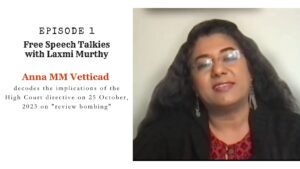The Delhi High Court’s contempt notice against Wikipedia started off as a hearing on a face off between the news agency Asian News International (ANI) and Wikipedia but is fast sliding into a freedom of speech issue for the online encyclopedia.
The dispute over the allegedly defamatory content posted about the powerful news agency began with its demand to take down the content and disclose the identity of editors who wrote allegedly defamatory sentences in the Wikipedia page on it.

Internet freedom organisations like the Software Freedom Law Centre, India, have expressed concern over the defamation suit against the Wikimedia Foundation and said it is a “worrying step towards curtailment of freedom of expression, and open access to knowledge” (scroll down for full statement).
In a hearing on Sept 5, 2024, Justice Navin Chawla of the Delhi High Court took strong objection to the submission of Wikipedia’s counsel that it would take time to comply with a judicial order to disclose the identity of editors who wrote allegedly defamatory sentences in the ANI wikipedia page.
Hearing ANI’s plea that Wikipedia had failed to comply with the order, the judge said, “If you don’t like India, don’t work here”, the judge said. The judge further remarked that it would “ask Wikipedia to close its business transactions in India and will ask the government to block Wikipedia here.”
The genesis of the issue was the dispute between ANI and Wikipedia over references to the agency as a ‘propaganda tool” of the Indian government in a page on the agency published by the online encyclopedia. The sentences ANI found objectionable and defamatory were all referenced from already published content in prominent news publications and websites.
Wikipedia’s page on ANI said that the agency “has been criticized for having served as a propaganda tool for the incumbent central government, distributing materials from a vast network of fake news websites, and misreporting events.” The statements have all been attributed to already published reports.
ANI sought to restrain Wikipedia from publishing allegedly defamatory content about it and sought removal of the content and Rs Two Crore as damages from Wikipedia. ANI alleged that false and misleading content on the news agency were published on the Wikipedia page in May 2024, which it claimed was a deliberate reversal from an earlier edit which it said was a true and factual position, on the same page in April 2024.
ANI sought to know the identity of the three editors who had made the changes to the page. ANI argued that Wikipedia had actively participated in reversing the edits and had therefore lost its safe harbour protection under section 79(1) of the amended Information Technology Act, 2000.
Wikimedia Foundation, which runs Wikipedia as a non profit with volunteer editors, has a stated policy to protect the anonymity of its editors. Its open editing model works with a vibrant community across the world.
Statement from Software Freedom Law Centre, India (SFLC.in) on the Defamation Proceedings against Wikimedia Foundation
The recent defamation lawsuit against the Wikimedia Foundation is a worrying step towards curtailment of freedom of expression, and open access to knowledge.
Since 2001, the Wikimedia Foundation has facilitated open access to knowledge and information across the world.Wikipedia functions as the most accessed online encyclopedia globally, with free articles available in more than 300 languages. Based on the principles of the open-source community, Wikipedia is maintained through a community of volunteers who strive to ensure that the online compendium remains reliable, open, and neutral. It places emphasis on information that is verifiable and accurate, based on citations from reliable
sources.
The defamation lawsuit against the Wikimedia Foundation constitutes a worrying step towards arbitrarily curtailing the freedom of expression, and open access to knowledge.Wikipedia enjoys safe harbour protection under Section 79 of the Information Technology Act, 2000, subject to compliance with certain requirements. Stripping it off the vital protection guaranteed under law, will expose the platform to countless suits in relation to user content posted on its platform. This would inevitably lead to the self-censorship and over-regulation of free expression, causing a ‘chilling effect’ on free speech in India. It would risk transforming the largest online encyclopedia on the Internet to self-censor and restrict the free flow of information in the digital age.
Further, directions to disclose the identity of volunteers or users, has the potential to infringe on the right to privacy, guaranteed under Article 21 of the Constitution and to in turn thwart free speech by causing a chilling effect.
SFLC.in has been a proponent of free and open access to knowledge, and free speech. Attempts to stifle free expression of ideas goes against the grain of the open and decentralized nature of the Internet.
SFLC.in stands firmly against any efforts to undermine the Wikipedia community, recognizing that such actions pose grave threats to the freedom of speech and expression, and open knowledge on the Internet.


